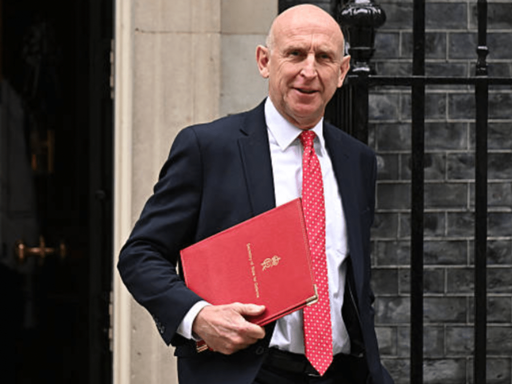According to defence secretary John Healey, we are in an age of hard power. China, Russia, Iran, and the India-Pakistan conflict were all mentioned in his latest speech. So were nukes. Even an endorsement of US president Donald Trump’s views on Europe. Yet despite British support for Israel’s slaughter there, Gaza didn’t merit a single mention.
Healey, an arch Blairite who was in Blair’s cabinet from 1997, heaped praise on the City of London, the bastion of British corporate power, who hosted his speech Monday. He said City leaders were:
A great example of the many people and companies in the Square Mile who go the extra mile to support our military and we thank you.
Hard power age
Healey announced new powers for the military to shoot down drones as we reported yesterday, along with a warning that the move signalled deepening militarism in the UK.
Healey described a “new era of threat” in a “more unstable, more uncertain, more dangerous” world:
And not since the end of the Second World War has Europe’s security been at such risk of state-on-state conflict.
So this new era of threat demands a new era for defence.
This is now an age for hard power, strong alliances and sure diplomacy.
He noted recent Chinese and Russian activities and the recent clash between Indian and Pakistan, adding:
It was before European nations had forcefully – and rightly – challenged by President Trump to shoulder more of Europe’s security.
New Deal for the war machine?
Invoking the post-war New Deal – largely a program of public spending, reform and uplift – Healey said:
As I look ahead to the rest of this decade our task, in this new age of hard power is to secure peace in our continent and to forge stronger deterrence and resilience… a New Deal for European security.
And tonight, I want to set out for you what I see as the hallmarks of this New Deal… how we truly fight together as Allies… how we advance our advantage through innovation… and how we invest for the future.
It’s hard not to read this, especially when announced in the company of private capital, as a New Deal for arms firms and the rest of the military-industrial complex.
And NATO will continue to be central to the Starmer government’s vision:
…Britain’s strategic strength comes from our Allies and that Britain serve as democracy’s most reliable ally.
It was this principle that laid the foundation for the European security order forged by Ernest Bevin – the great post-War British Foreign Secretary.
A principle which found its fullest expression in NATO.
Military economy
Labour’s policy has been to tie defence to business, and to attempt to militarise society toward a war footing more broadly. Healey’s speech suggest that hasn’t changed:
Our Strategic Defence Review sets out how we will draw lessons from the war in Ukraine. A war which has demonstrated that a nation’s Armed Forces are only as strong as the industry and the investors and the innovators that stand behind them.
Post-2010 Tory austerity was framed as an assault on defence:
But to be plain about the facts, during the first five years of austerity from 2010, the day to day defence budget was slashed by nearly 20 per cent.
The answer: a gigantic boost in war spending. As ever, primarily into the pockets of defence firm shareholders:
A legacy our government confronted immediately by boosting defence investment this year – in our first year – by £5 billion.
Healey added:
…we’ve signed 1,000 major contracts since the election in July 2024, 1,000 major contracts, 86 per cent of them with British-based businesses.
War footing
Healey’s choice of the City of London is significant. Thought it must be said getting corporate elites onboard with extractive foreign policy and arms firm profits isn’t exactly challenging.
All in all, the address reaffirms Labour’s policy of recruiting the whole of society to so-called military Keynesianism – an economy built around war.
The Campaign for Nuclear Disarmament (CND) has proposed an alternative defence policy rooted in
…human security and common security—prioritising diplomacy, global cooperation, conflict prevention, and investment in health, education, climate resilience, social care, and the creation of well-paid, secure, unionised and socially useful jobs.
Professor Karen Bell, editor of the proposal, said:
This report offers a credible, democratic alternative to militarism: a sustainable economy grounded in social justice, global solidarity, and the urgent need to build peace—not war—for the 21st century.
And this is precisely the kind of alternative we need to be looking at. With war in Ukraine and flashpoints around the world, along with the dangers of climate change and inequality spiralling, a focus on discredited theories of hard power and inter-state competition need to go into the dustbin of history where they belong.
Featured image via the Canary
By Joe Glenton
From Canary via this RSS feed


